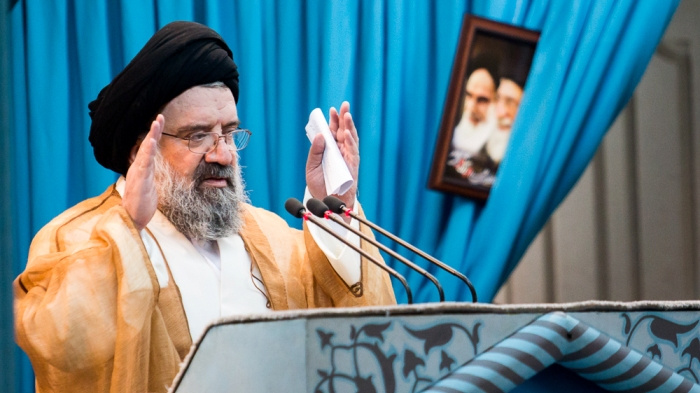Iran’s Friday Prayers: Assembly of Experts, Hajj and economy

(Ahmad Khatami, this week's leader of the Friday prayers. Picture: Arash Mirsepasi/YJC)
Friday prayers' leaders across the country sounded upbeat this week as Ahmad Jannati was elected of spokesmanship of the newly formed Fifth Assembly of Experts, body in charge of supervising and selecting the Supreme Leader. Ahmad Jannati, head of the Guardian Council and a nemesis of the Reformists, who had entered the assembly only as the last eligible candidate in Tehran, was elected to the post with 51 out of 88 votes to Reformists' chagrin who had touted victory in both parliament and assembly elections in February.
"What the Experts did -and in fact the people did- was a slap in the mouth of the US, the UK, and imperialist media," said Ahmad Khatami, Friday prayers' leader of Tehran this week. Khatami referred to the "imperialist media's smear campaign" against head of the Guardian Council before the elections, adding that Jannati's election as speaker of the Assembly showed that such campaigns are futile in the long run, if not in short term. In Qazvin, northwest of Tehran, Abdolkarim Abedini also did not conceal his satisfaction with Jannati's election, expressing satisfaction that all efforts by 'the West' and 'global imperialism' were thwarted by this choice. In Ahwaz, center of the oil-rich Khouzestan Province, Mohsen Heydari called Jannati's election a "revolutionary choice", "a slap in the mouth of imperial loudspeakers who made irrelevant remarks" against Iran's revolutionary clerics. "The Assembly of Experts acts independently, and in line with the Supreme Leader", he added.
In Tehran, Ahmad Khatami also addressed the issue of "soft war" waged by the 'enemy', i.e. the West, against Iran. "What they failed to achieve during the eight-year Imposed War [of Saddam Hussein against Iran] and through sanctions and propaganda, they are trying to gain through soft war" he said. Tehran's Friday prayers' sermonizer echoed Ayatollah Khamenei's concerns, warning about infiltration by the enemy in decision-making centers of the establishment, and about tarnishing the image of "revolutionary, pious elements" by calling them 'extremists'.
On the brink of the annual pilgrimage to Mecca and Medina, the Hajj, which is Muslims' most important annual gathering, Friday prayers' sermonizers slammed Saudi Arabia for its treatment of Iranian pilgrims. Last year, the Mina stampede led to death of more than 400 Iranian pilgrims, aggravating the already tense situation between Tehran and Riyadh. "Our people respect their dignity and demand a Hajj in which they are not insulted and their security is established," said Ahmadi Khatmai in Tehran, amid the news of failure of negotiations between Iranian and Saudi officials over this year's Hajj. "The House of Saud is not capable of administering the Two Holy Mosques" in Mecca and Medina Khatami asserted. "These should be governed by a delegation of Islamic countries … whose soul is filled with hatred towards Imperialism." In Zahedan, center of Sistan va Baluchistan Province in southeastern Iran, Abbasali Soleymani also slammed Saudi Arabia for the last year's catastrophic incidence, asserting that Saudi Arabia is not capable of handling such a massive ceremony. "There needs to be a revision in holding the Hajj ceremony," he said. "The Al Saud regime is inadequate and incapable of governing the Two Holy Mosques."
In Mashhad, Mohammad-Bagher Farzaneh called economic challenges the most urgent concern of the country, criticizing those who "only make speeches" instead of tackling economic woes. Though not explicitly expressed, it was clear that Farzaneh was speaking of Hassan Rouhani and his administration when he slammed "those who are obsessed by pomp, those who only want to dominate more seats in the cabinet and the parliament, those who have tied hope to a bunch of lunatic, violent mercenaries in Europe and other places to solve problems of the people". Meanwhile in Khorramabad, west of Iran, Friday prayers' sermonizer Ahmad Miremadi stated that economy of resistance, Supreme Leader Ayatollah Khamenei's economic doctrine, "can be materialized only by relying on domestic capabilities and capacities."

